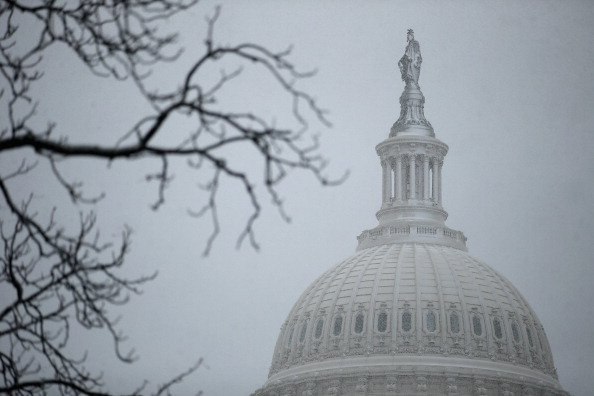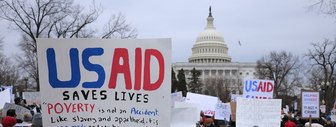Regarding the US economy, the world as a whole, and their own family's circumstances, Americans are the most pessimistic they have been in several years
Americans have weathered several years of negative feelings about the economy, fears for the state of the world, and worries about their own family’s finances. Now they are greeting 2014 with a surprising amount of pessimism, according to the latest Economist/YouGov Poll. On the eve of the New Year, Americans are less positive than they have been in years about how the country’s economy, the world as a whole, and their own family’s circumstances will fare in the next 12 months.
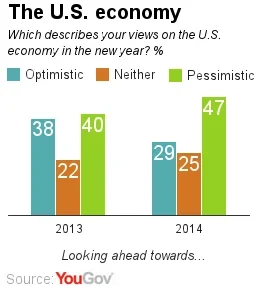
Nearly half the country is pessimistic about the state of the economy next year – and less than a third are optimistic. Since the start of the Great Recession in 2008, Americans have been more willing to think the economy is getting worse than to say it is improving, despite the steady improvement in most economic indicators. This poll continues that negative assessment when it comes to the economy.
At the start of 2013, Americans looked more favorably on the economy than they do today. About the same percentage was optimistic as pessimistic about what the year now past would be like.
Pessimistic views now also outweigh optimistic ones when it comes to predicting what will happen in the world. And the public also has become more pessimistic with time. When Americans looked ahead to 2010, 2011, and 2012, positive assessments outweighed negative ones, although the margins shrunk each year. Now, Americans are decidedly pessimistic about the coming year.
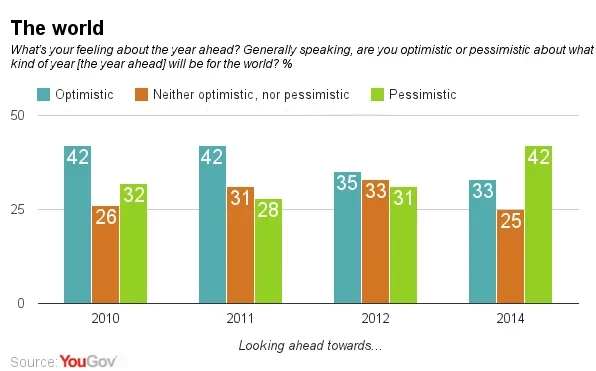
Views of the future economy and the state of the world are polarized, and appear to have a lot to do with how Americans view the current Democratic White House incumbent. In this week’s poll, more than 70% of Republicans are pessimistic about both the 2014 economy and the 2014 world. Just about half of Democrats are optimistic. At the start of 2010, Democrats were only a little more optimistic than they are today when they looked ahead to the state of the world. More than a third of Republicans were optimistic then, too. Now just 13% of Republicans are optimistic about the state of the world.
Some of those partisan differences carry over when Americans are asked to assess what they think 2015 will be like for their family. Overall, the public is a little more optimistic than pessimistic, with Democrats more optimistic and Republicans more pessimistic.
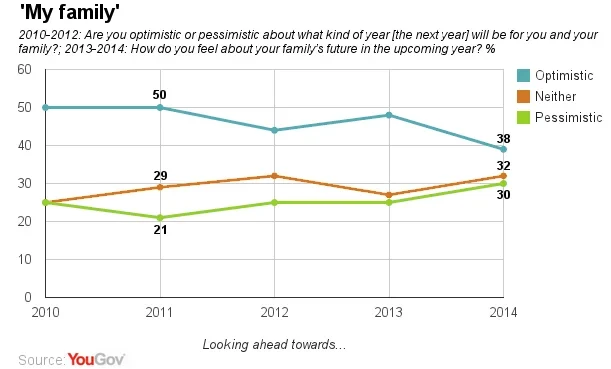
At the start of 2010, both Democrats and Republicans were optimistic.
At the beginning of 2010 and 2011, half the public was optimistic about what the next year would hold for their family. That dropped to 44% at the start of 2012. It was 48% at the start of 2013. This year, only 39% are optimistic about their family’s prospects in the next year. The pessimistic percentage has risen to 30%.
There are pretty much no policy areas where more Americans think things will get better next year than expect things will get worse. And the recent partisan wrangling in Washington over the federal budget, along with the last three problem-plagued months of the Affordable Care Act’s rollout have clearly dampened expectations on both counts. Half say health care coverage will be worse next year, half say the same about government spending.
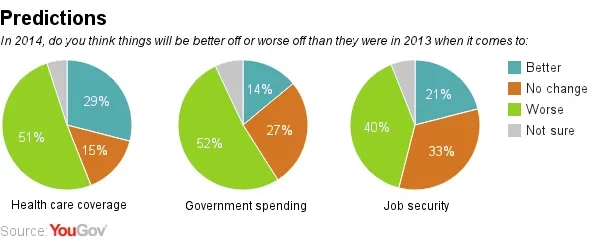
About twice as many say job security will be worse than think it will be better in 2014.
In recent polls, nearly two in three Americans have reported that they believed Congress did less in 2013 than it usually accomplishes in a single year. What about 2014? If the public is correct, the new year won’t be a good year either. Only 11% believe Congress will accomplish more next year than it did in this one. More than twice as many say it will do even less.
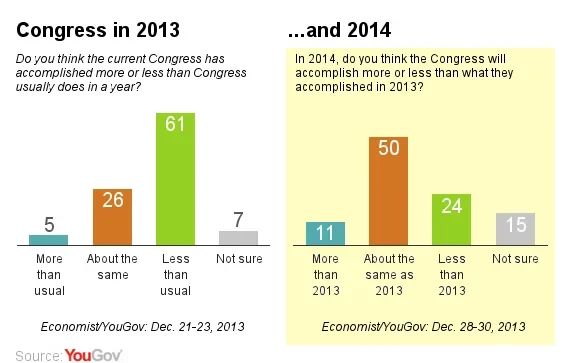
Congress could have a hard time doing worse when it comes it its overall image. Several times in the last year, its overall approval rating dropped to just 6% in the Economist/YouGov Polls. In the poll conducted on the last weekend of the year, 9% approved of how Congress is handling its job. 70% disapproved.
Full results can be found here.
Economist/YouGov poll archives can be found here.
